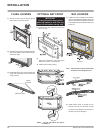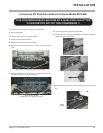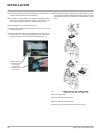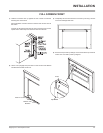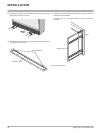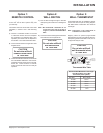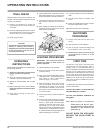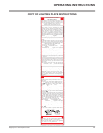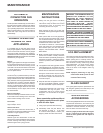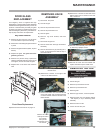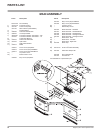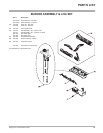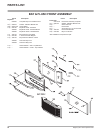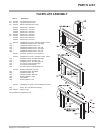
22
Regency E21 Gas Fireplace Insert
MAINTENANCE
INSTRUCTIONS
1)
Always turn the gas valve to off before
cleaning. For relighting, refer to lighting
instructions. Keep the burner and control
compartment clean by brushing and
vacuuming at least once a year.
When cleaning the logs, use a clean soft
paint brush as the logs are fragile and easily
damaged.
2)
Clean (never when unit is hot) appliance,
door and louvers with a damp cloth. Never
use an abrasive cleaner. The gold louvers
(and optional gold door) may be scratched
if abrasives are used to clean them.
The heater is fi nished in a heat resistant
paint and should only be refi nished with
heat resistant paint (not with wall paint).
Regency uses StoveBrite Paint - Metallic
Black #6309.
3)
Make a periodic check of burner for proper
position and condition. Visually check the
fl ame of the burner periodically, making sure
the fl ames are steady; not lifting or fl oating.
If there is a problem, call a qualifi ed service
person.
4)
The appliance and venting system must be
inspected before use, and at least annually,
by a qualifi ed fi eld service person, to ensure
that the fl ow of combustion and ventilation
air is not obstructed.
During the annual service call, the burners
should be removed from the burner tray
and cleaned. Replace the embers but do
not block the pilot.
5)
Keep the area near the appliance clear and
free from combustible materials, gasoline
and other fl ammable vapours and liquids.
6)
Each time the appliance is lit, it may cause
condensation and fog the glass. This
condensation and fog is normal and will
disappear in a few minutes as the glass
heats up.
Never operate the appliance without
the glass properly secured in place
or with the door open.
7)
Verify proper operation after servicing.
8)
Periodically check the pilot fl ames, see
the diagrams on page 11. If you have
an incorrect fl ame pattern, contact your
Regency dealer for further instructions.
MAINTENANCE
LOG REPLACEMENT
The unit should never be used with broken logs.
Turn off the gas valve and allow the unit to cool
before opening door to carefully remove the
logs. The pilot light generates enough heat to
burn someone. If for any reason a log should
need replacement, you must use the proper
replacement log. The position of these logs
must be as shown in the diagram under Log
Installation.
NOTE: Improper positioning of logs may
create carbon build-up and will alter
the unit’s performance which is not
covered under warranty.
GLASS GASKET
If the glass gasket requires replacement use
7/8" fl at glass gasket (Part # 936-243) for the
Bay Front and for the Flush Front.
GOLD-PLATED
ACCESSORIES
The 24 carat gold plated fi nish on the accessories
requires little maintenance, and need only be
cleaned with a damp cloth. DO NOT use abrasive
materials or chemical cleaners, as they may
harm the fi nish and void the warranty.
Clean any fi ngerprints off before turning the
unit on. If the top louvers start to discolour,
check the door gasket seal and replace if
necessary.
AUTOMATIC
CONVECTION FAN
OPERATION
The fan operates automatically, turn the knob on
the side of the faceplate to adjust to the desired
speed. The fan will turn on as the stove comes
up to operating temperature. After the unit has
been turned off and the unit cooled to below a
useful heat output range the fan will shut off
automatically.
NORMAL OPERATING
SOUNDS OF GAS
APPLIANCES
It is possible that you will hear some sounds
from your gas appliance. This is perfectly normal
due to the fact that there are various gauges
and types of steel used within your appliance.
Listed below are some examples. All are
normal
operating sounds
and should not be considered
as defects in your appliance.
Blower:
Regency gas appliances use high tech blowers
to push heated air farther into the room. It is not
unusual for the fan to make a "whirring" sound
when ON. This sound will increase or decrease
in volume depending on the speed setting of
your fan speed control.
Burner Tray:
The burner tray is positioned directly under the
burner tube(s) and logs and is made of a different
gauge material from the rest of the fi rebox and
body. Therefore, the varying thicknesses of steel
will expand and contract at slightly different
rates which can cause "ticking" and "cracking"
sounds. You should also be aware that as there
are temperature changes within the unit these
sounds will likely re-occur. Again, this is normal
for steel fi reboxes.
Blower Thermodisc:
When this thermally activated switch turns ON
it will create a small "clicking" sound. This is the
switch contacts closing and is normal.
Pilot Flame:
While the pilot fl ame is on it can make a very
slight "whisper" sound.
Gas Control Valve:
As the gas control valve turns ON and OFF, a
dull clicking sound may be audible, this is normal
operation of a gas regulator or valve.
Unit Body/Firebox:
Different types and thicknesses of steel will
expand and contract at different rates resulting
in some "cracking" and "ticking" sounds will be
heard throughout the cycling process.
WARNING: CHILDREN AND ADULTS
SHOULD BE ALERTED TO THE
HAZARDS OF HIGH SURFACE
TEMPERATURE AND SHOULD
STAY AWAY TO AVOID BURNS OR
CLOTHING IGNITION. YOUNG
CHILDREN SHOULD BE CAREFULLY
SUPERVISED WHEN THEY ARE IN THE
SAME ROOM AS THE APPLIANCE.
CAUTION: ANY SAFETY SCREEN OR
GUARD REMOVED FOR SERVICING AN
APPLIANCE MUST BE REPLACED PRIOR
TO OPERATING THE APPLIANCE.
CLOTHING OR OTHER FLAMMABLE
MATERIAL SHOULD NOT BE PLACED
ON OR NEAR THE APPLIAN
CE.



